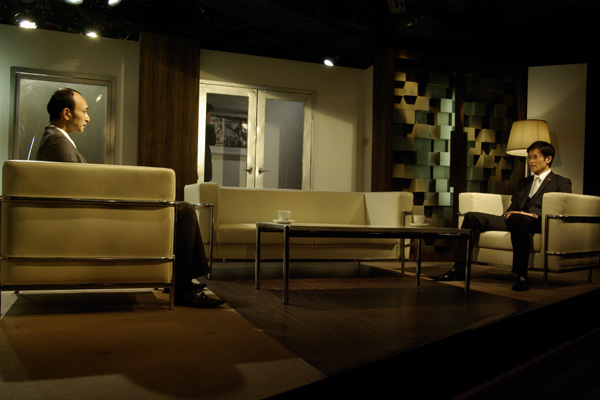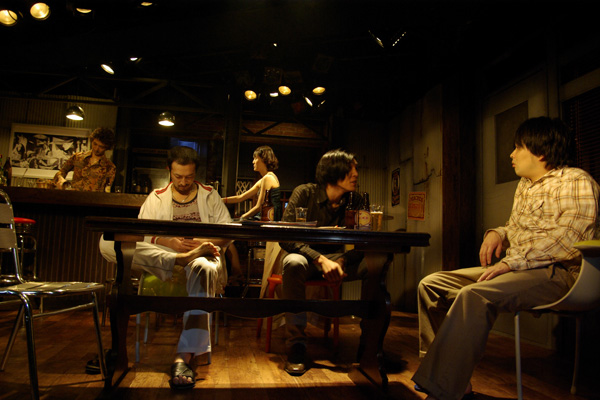Prologue. The large part of the stage to the right is set as the interior of a bar, while the left-hand side is set as the bar-owner’s living area.
The bar-owner, Masataka Harumi, rises from his bed. One of last night’s customers, Arisu, also sits up in the bed.
Masataka’s cousin Riko enters. She is married to the local yellowtail fish farm owner, Katana Yamato, but has sought refuge here to escape her husband’s domestic violence. Masataka has provided her shelter in his home. Riko is followed in by Katana’s younger brother Homare, who is having an affair with Riko. As Arisu and Masataka talk, Homare and Riko moan in the background.
A screen comes down and Masataka begins a narration, along with subtitles projected on the screen. All at once he relates how he was born out of wedlock, lost his mother at the age of three and grew up living with his grandfather, aunt and uncle and cousin Riko in this town. At school he suffered bullyig, his father showed up when he was in middle school. In high school he studied in Australia and then went to college in New York. Three months earlier he returned to this town and opened a bar. The scene ends with the subtitle “Prologue – Town of Chains” on the screen.
The scene returns to the bar. Homare, his Korean-Japanese classmate Cho Kei-ji and Arisu are drinking.
Katana shows up looking for Riko. He discovers that Riko is living here and takes her home in what appears to be a temporary reconciliation.
Masataka’s former classmate, Taisei Oshima, appears. Taisei talks with excessive passion about animal protection. He apologizes to Masataka, saying that he realized the value of life when he pushed Masataka off the roof of their elementary school when they were schoolmates.
After Cho excuses himself and leaves, another former classmate who is now a detective, Sanji Tokito, enters. Sanji was also one of the culprits that pushed Masataka off the roof. The cause of that incident is revealed. During a special class on the subject of world peace that dealt with the Rape of Nanking when they were 5th graders, their teacher had mentioned that Masataka’s grandfather was serving in the army during the China campaign.
Katana appears again. Sanji says he was investigating a claim that a toxic chemical was being used at Katana’s fish farm. He adds that it was Riko who filed the initial complaint. While Katana and Sanji argue, Homare admits that the chemical was being used. He insists that if the [defoliant] chemical isn’t used the fish cage nets become clogged with seaweed and fish farming can’t be done, and that it is being used with the consent of the fisheries cooperative union.
When Masataka brings in Riko, Katana rebukes her. Riko retorts that the conflict over the chemical was the cause of Katana’s domestic violence. As he leaves to go to the police station, Katana says that he knows Riko and Homare are having an affair and leaves the rest up to them.
As he leaves, Cho returns to the bar.
After searching for something in the next room, Arisu is contacting someone by phone.
Taisei comes in short of breath, ranting that a missing puppy’s bone and head were found in the garbage bin at Cho’s house. Cho suspects that it might be his grandfather’s doing and apologizes, but Taisei come at him swinging a bat. Sanji takes out his gun and intervenes. Just then word comes in that Katana has hung himself at home in his yard.
The bar is empty now, as Arisu enters. She has come to admit that she has been asked by both Masataka’s father, who has been told he has only a short time left to live, and by his wife to find out if Masataka is worthy of receiving the family inheritance or not. She has decided that he is worthy. As if drawn in by Masataka’s sadness at the news of his father’s state, the hearts and bodies of Arisu and Masataka come together.
Once again Masataka’s narration with screen and subtitles begins. We are told that with his inheritance, Masataka has started a tuna fish farming business with Homare and then started a successful chain of sushi restaurants using the fish he raises. Homare and Riko and Masataka and Arisu have all married. We learn that Arisu has Japanese citizenship but is actually Chinese, a fact that has to be kept secret from Riko, who has a strong loathing of the Chinese because her house was once burned by Chinese. Also we hear that the fish farming business suffered big losses when their fish cage nets were cut by animal protection activists.
Also, several years later China has become stronger as a nation and in Japan the younger generation has regressive movement based in a renewed interest in their country’s traditional culture.
On the screen the words “Sequel – Eccentric Game-playing” appear and the narration continues.
There is now an agency in the USA that books trips to the Moon and Masataka has signed up for a trip on the 23rd shuttle. But the ship suffers engine trouble and they are stranded in space. They run out of food and water and some passengers begin to die, but Masataka barely manages to survive.
Then, a few years later in China, where the number of Japanese corporations entering the Chinese market has cause anti-Japanese sentiments to rise in China, the government instigates restrictions on Japanese corporations in all but a few industries like the food and restaurant industry.
The lights die and the scene changes.
Tokyo. The scene is a reception room next to the president’s office in Masataka’s office building. The now vice-president, Homare brings in the China’s Ambassador Lee and an employee named Sakaeda of the steel company Bao Steel Japan. Accompanied by Sanji, who now works as a bodyguard, president Masataka and his wife Arisu enter. Masataka has just returned from China on a mission as the Friendship Ambassador of his hometown, which is not a sister city with Nanking. Before the business meeting, Homare gives Ambassador Lee and the others a tour of the company.
Meanwhile, it is announced that the journalist Tatae, who is the late Katana’s twin brother (played by the same actor as Katana) has come on a visit. Masataka starts off by asking them to resolve the problem of the past affair between Riko and Homare before Katana’s death, and the three, Homare, Tatae and Riko begin to talk, but Homare is unable to explain himself successfully and it is decided that they will get a divorce. Next, Tatae tries to get Masataka to talk about the facts of the stranded shuttle flight to the Moon but Masataka refuses to talk about the subject at all.
Arisu returns and begins to talk about the diagnosis from her doctor that the child she is carrying may be deformed. Masataka tells her to go ahead with the birth, saying, “I will love any child you give birth to.”
Riko announces the arrival of Diet member Mayama. Mayama is critical of Masataka for his pro-China stance. But the real reason Mayama is here is to ask for support in getting out the vote for the coming election, where his position in Kyushu is weakened. But Masataka says he can’t support Mayama’s party as long as it is considering economic restrictions against China. Mayama says that the fact he is his mother’s legitimate child may be a detriment in this case, but Masataka doesn’t fall for his ploy and the discussions end with no agreement.
Ambassador Lee and his party return. The main subject of discussion is the China side’s request for Masataka to offer his company’s land for a new factory for Bao Steel in his hometown. Masataka refuses, citing the need to maintain the local water quality for the fish farming industry. But Lee proposes that if the factory project is accepted, he will negotiate with high government officials in China to remove some of the restrictions keeping Japanese companies out of the Chinese market.
Homare continues to refuse the Chinese proposal, but Masataka has taken an interest in it. He sees it as a great opportunity to improve relations between the two countries. Homare becomes irate at Masataka’s change of heart and shouts angrily that he will never let a factory come in that will dirty the soil where his brother’s grave it. Seeing this, Lee laughs off such personal reasons for such a decision. Masataka admonishes Homare, saying that the actions they will be taking are far more important than personal feelings or corporate interests.
The last visitor of the day is Taisei, who has become a member of a radical animal rights organization. Taisei wants Masataka to loosen security at the fish farms so they can cut the fish cage nets and let the tuna free. Masataka rejects Taisei’s proposal, but Taisei has a trump card up his sleeve. He starts talking about the fateful relationship between Masataka’s parents. He says that anger at Masataka’s father’s continued infidelity caused his legal wife to order thugs to kill Masataka’s mother and make it look like an accident. He also says that Masataka married Arisu without knowing that she is actually his father’s illegitimate child.
The couple are terribly shocked by this accusation. But, Masataka and Arisu say that their love is unshaken and vow that they will not succumb to threats. Taisei calls in accomplices that have snuck into the building and they attach a small bomb to Masataka’s arm. The bomb is set to go off in two minutes. “If you want to save yourself, cut off your arm and free the bomb from it,” says Taisei, handing him one of the building’s emergency-use axes and then running for cover.
Arisu hesitates. With 15 seconds left on the time bomb she finally chops down with the axe screaming. She removes the bomb and throws it away. The roar of the explosion. “I have survived yet again, sighs Masataka. Thinking of the future of their coming child, the couple embrace each other.




